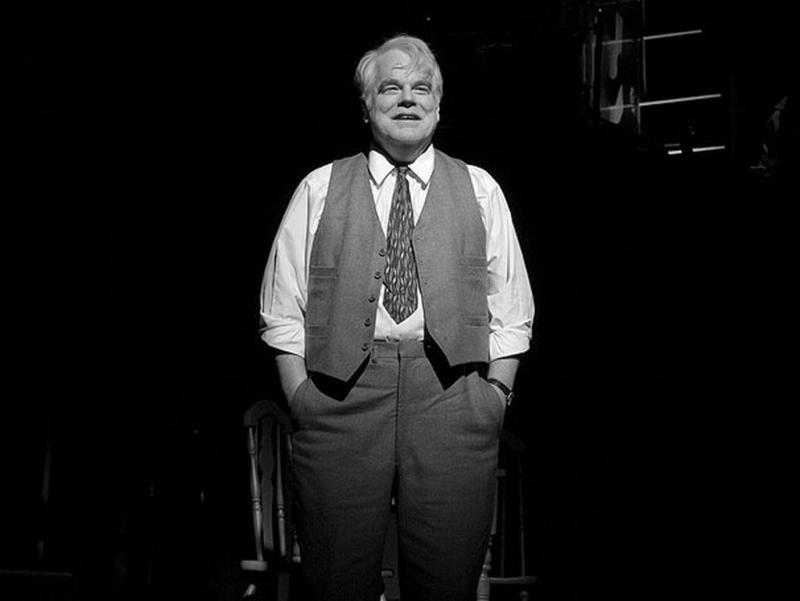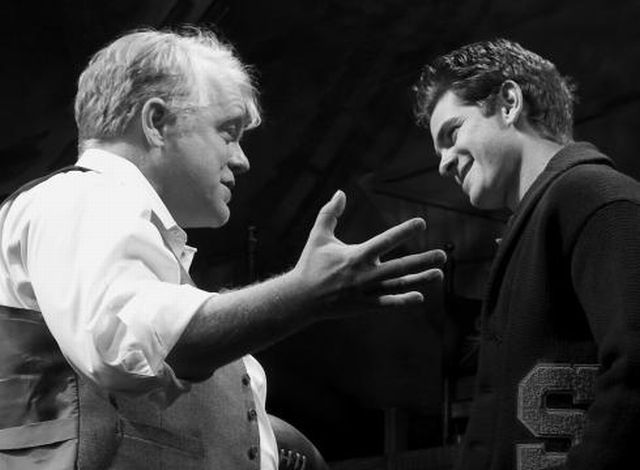Philip Seymour Hoffman, Giant of the Stage | reviews, news & interviews
Philip Seymour Hoffman, Giant of the Stage
Philip Seymour Hoffman, Giant of the Stage
The consummate actor's actor was at home on stage as well as screen

On screen, Philip Seymour Hoffman will be forever immortalised as the Oscar-winning star of Capote who was both a darling of the indie film world (think Todd Solondz and the Coen Brothers) and an invaluable supporting player in such mainstream fare as Moneyball, Charlie Wilson's War, and the Hunger Games franchise.
His high-profile Broadway appearances - each one nominated for a Tony - were in canonical works by Sam Shepard (True West, in 2000, in which he swapped roles throughout the run with co-star John C. Reilly), Eugene O'Neill (Long Day's Journey Into Night in 2003), and, of course, Salesman, Arthur Miller's abiding masterwork in which the actor brought a rumpled fury and near-savage, deep-voiced grace to the role of a man who - irony of ironies - embarks upon a collision course with death. Hoffman (pictured below with co-star Andrew Garfield as Biff) was a youngish Willy Loman, a part often played by someone a generation older than he was at the time, but from his first, silent appearance on the stage of the Barrymore Theatre, there was no doubt that an iconic part was in the hands of someone possesed of a bearish pugilism whose rage against the dying of the light was at once gripping and painful to behold. (Accepting that year's Best Actor Tony, One Man, Two Guvnors star James Corden paid touching tribute to his fellow nominee.)
 Nearly a decade earlier, and as for all intents and purposes the junior member of a quartet of stars headed by Vanessa Redgrave and Brian Dennehy, Hoffman's Jamie Jr. in O'Neill's grievous family drama was marked out by a physicality that lent a terrifying intensity to the character's face-off with his tubercular younger brother (played in that production by Robert Sean Leonard). And trading roles as the two brothers in Sam Shepard's raucous tragicomedy, Hoffman switched on a Janus-faced dime from a shambolic presence (Lee) to a more orderly one (Austin) in a play about disorder and chaos in all its forms.
Nearly a decade earlier, and as for all intents and purposes the junior member of a quartet of stars headed by Vanessa Redgrave and Brian Dennehy, Hoffman's Jamie Jr. in O'Neill's grievous family drama was marked out by a physicality that lent a terrifying intensity to the character's face-off with his tubercular younger brother (played in that production by Robert Sean Leonard). And trading roles as the two brothers in Sam Shepard's raucous tragicomedy, Hoffman switched on a Janus-faced dime from a shambolic presence (Lee) to a more orderly one (Austin) in a play about disorder and chaos in all its forms.
But it was away from the Broadway glare that Hoffman left an arguably more lasting impact via his relationship with the costume designer Mimi O'Donnell, the mother of their three children. O'Donnell last April became artistic director of the LAByrinth Theatre Company, the enterprising Off Broadway troupe behind the London transfer to the Donmar in 2002 of the Stephen Adly Guirgis play, Jesus Hopped the 'A' Train, which Hoffman directed. (He returned to the London stage in 2008 to direct the disappointing Andrew Upton play Riflemind at the Trafalgar Studios.) And it was a measure of Hoffman's connectedness to the New York stage that with memories of his 2006 Oscar trophy still fresh in everyone's minds (his competition at the Academy Awards included Heath Ledger, another great actor to die way too young under similar circumstances) that he was back on the Off Broadway stage at the Public Theatre the next year to star in the Bob Glaudini play Jack Goes Boating - which Hoffman later directed and starred in on screen.
And yet, for those who saw it, Hoffman in theatre terms may be most pertinently remembered for the 1998 Off Broadway premiere of Mark Ravenhill's London hit, Shopping and Fucking, in which he played the drug-dependent, deep-walleted Mark. There, on eerily prescient view, was a young man battling much the same addiction that 16 years later would do this brilliant actor in.
The future of Arts Journalism
You can stop theartsdesk.com closing!
We urgently need financing to survive. Our fundraising drive has thus far raised £33,000 but we need to reach £100,000 or we will be forced to close. Please contribute here: https://gofund.me/c3f6033d
And if you can forward this information to anyone who might assist, we’d be grateful.

Subscribe to theartsdesk.com
Thank you for continuing to read our work on theartsdesk.com. For unlimited access to every article in its entirety, including our archive of more than 15,000 pieces, we're asking for £5 per month or £40 per year. We feel it's a very good deal, and hope you do too.
To take a subscription now simply click here.
And if you're looking for that extra gift for a friend or family member, why not treat them to a theartsdesk.com gift subscription?
more Theatre
 Personal Values, Hampstead Theatre review - deep grief that's too brief
New play about two sisters, death and hoarding is well written, but feels incomplete
Personal Values, Hampstead Theatre review - deep grief that's too brief
New play about two sisters, death and hoarding is well written, but feels incomplete
 Ghosts, Lyric Hammersmith Theatre - turns out, they do fuck you up
Ten years on, Gary Owen and Rachel O'Riordan top their triumphant Iphigenia in Splott
Ghosts, Lyric Hammersmith Theatre - turns out, they do fuck you up
Ten years on, Gary Owen and Rachel O'Riordan top their triumphant Iphigenia in Splott
 All the Happy Things, Soho Theatre review - deep feelings, but little drama
New play about a sibling’s death is well imagined and deeply felt, but a bit slender
All the Happy Things, Soho Theatre review - deep feelings, but little drama
New play about a sibling’s death is well imagined and deeply felt, but a bit slender
 Shanghai Dolls, Kiln Theatre review - fascinating slice of history inadequately told
Amy Ng's take on two Chinese titans needs more dramatic ballast
Shanghai Dolls, Kiln Theatre review - fascinating slice of history inadequately told
Amy Ng's take on two Chinese titans needs more dramatic ballast
 Manhunt, Royal Court review - terrifyingly toxic masculinity
After his Olivier Award win for Oedipus, Robert Icke turns to a modern “monster”
Manhunt, Royal Court review - terrifyingly toxic masculinity
After his Olivier Award win for Oedipus, Robert Icke turns to a modern “monster”
 Midnight Cowboy, Southwark Playhouse - new musical cannot escape the movie's long shadow
Two misfits misfire in misconceived show
Midnight Cowboy, Southwark Playhouse - new musical cannot escape the movie's long shadow
Two misfits misfire in misconceived show
 Thanks for Having Me, Riverside Studios review - snappily performed comedy with a lightweight core
Writer-actor Keelan Kember floods the stage with a torrent of gags but few ideas
Thanks for Having Me, Riverside Studios review - snappily performed comedy with a lightweight core
Writer-actor Keelan Kember floods the stage with a torrent of gags but few ideas
 Rhinoceros, Almeida Theatre review - joyously absurd and absurdly joyful
Ionesco classic gets an entertainingly vivid and contemporary update
Rhinoceros, Almeida Theatre review - joyously absurd and absurdly joyful
Ionesco classic gets an entertainingly vivid and contemporary update
 The Importance of Being Oscar, Jermyn Street Theatre review - Wilde, still burning bright
Alastair Whatley honours his subject in a quietly powerful performance
The Importance of Being Oscar, Jermyn Street Theatre review - Wilde, still burning bright
Alastair Whatley honours his subject in a quietly powerful performance
 Stiletto, Charing Cross Theatre review - new musical excess
Quirky, operatic show won't please everyone, but will delight many
Stiletto, Charing Cross Theatre review - new musical excess
Quirky, operatic show won't please everyone, but will delight many
 Alfred Hitchcock Presents: The Musical, Theatre Royal Bath review - not a screaming success
1950s America feels a lot like 2020s America in this portmanteau show
Alfred Hitchcock Presents: The Musical, Theatre Royal Bath review - not a screaming success
1950s America feels a lot like 2020s America in this portmanteau show

Add comment